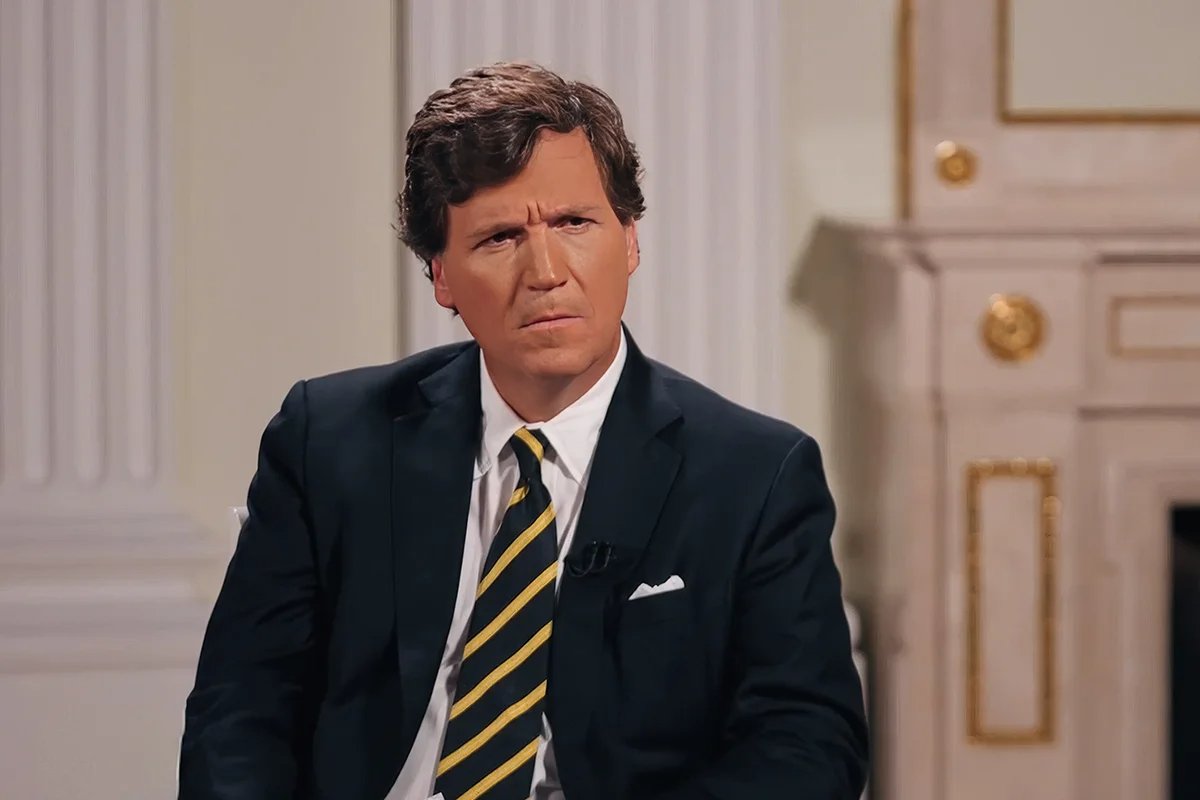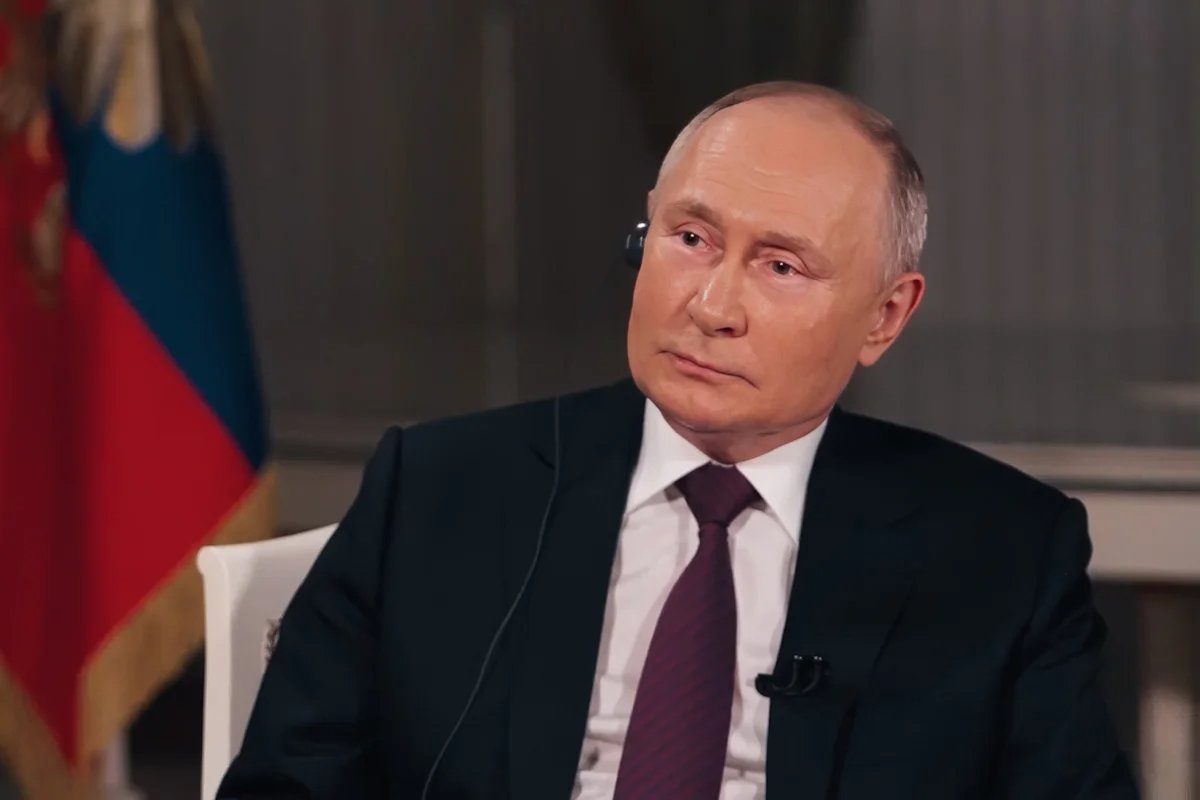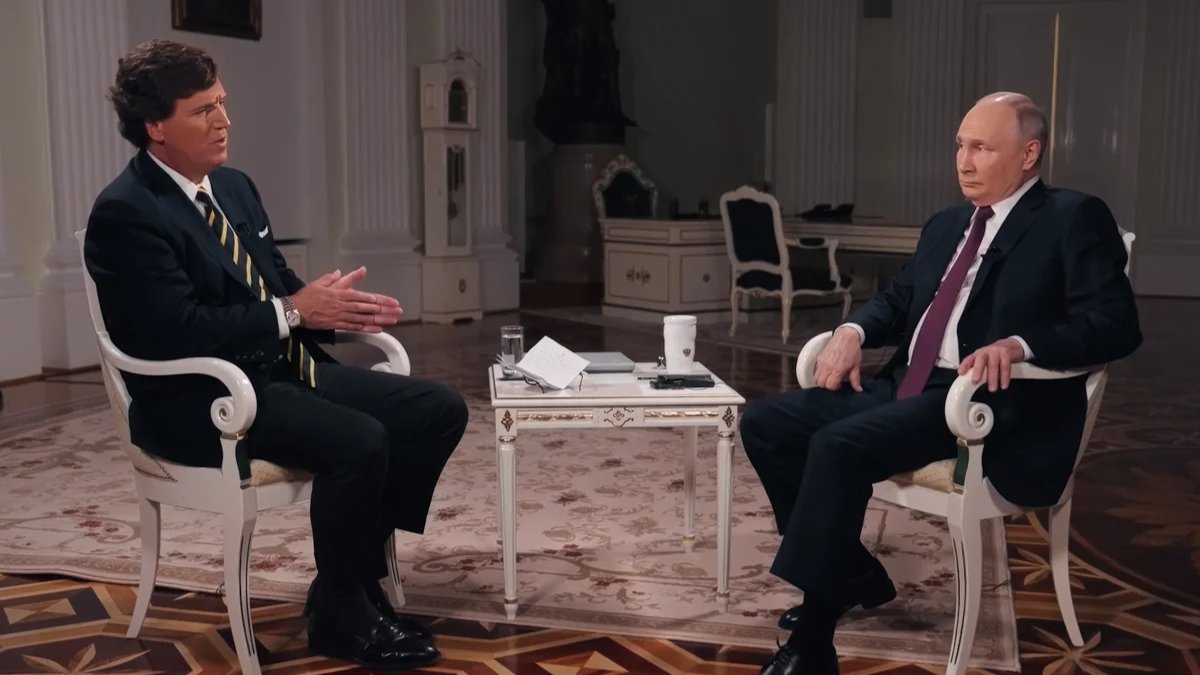Former Fox News host Tucker Carlson’s much-hyped interview with Vladimir Putin was released on Friday, the first sit-down interview the Russian president has granted to a broadcaster from the “collective West” since he ordered the full-scale invasion of Ukraine almost two years ago.
Putin’s spokesperson Dmitry Peskov had earlier chalked up Putin’s refusal to speak with other Western media outlets to their “one-sided position”, and said that the president had granted an interview request to Carlson as he was neither known to be pro-Russian nor pro-Ukrainian, in contrast with most other “traditional Anglo-Saxon media”.
The two-hour interview makes it abundantly clear just why Carlson, long held up by Russian state media as a rare exemplar of brave journalistic truth telling, is so popular with Putin — his questions are all softball, he asks almost no follow-ups and never once challenges Putin’s false claims, his historical inaccuracies or his outright lies.
The tone of the interview was set when Putin asked Carlson if he intended to have a serious conversation or whether this was a “talk show”. On receiving Carlson’s assurance that he wanted a serious conversation, Putin immediately launched into what he said would be a “30-second or one-minute” summary of Russian history that lasted for almost half an hour, much to Carlson’s visible frustration.
We sat through the entire poorly disguised propaganda vehicle so you don’t have to, and while very little of substance was said at any point, we’ve selected some of the most memorable and jaw-dropping exchanges.
On Russian-Ukrainian history
Vladimir Putin: Originally, the word ‘Ukrainian’ meant that a person was living on the outskirts of the state, near the fringe, or was engaged in border service. It didn’t mean any particular ethnic group.
So, the Poles were trying in every possible way to polonise this part of the Russian lands and actually treated it rather harshly, not to say cruelly. All that led to the fact that this part of the Russian lands began to struggle for their rights.
Tucker Carlson: I beg your pardon, can you tell us what period… I am losing track of where in history we are?
Vladimir Putin: It was in the 13th century.
Now I will tell what happened later and give the dates so that there is no confusion. And in 1654, even a bit earlier, the people who were in control of the authority over that part of the Russian lands, addressed Warsaw, I repeat, demanding their rights be observed and that they send to them rulers of Russian origin and Orthodox faith. When Warsaw did not answer them and in fact rejected their demands, they turned to Moscow so that Moscow took them away.
So that you don’t think that I am inventing things… I’ll give you these documents… letters from Bogdan Khmelnitsky, the man who then controlled the power in this part of the Russian lands that is now called Ukraine.
Tucker Carlson: It doesn’t sound like you are inventing it, but I am not sure why it’s relevant to what happened two years ago.

On the meaning of ‘denazification’
Vladimir Putin: It was they [Ukraine] who started the war in 2014. Our goal is to stop this war. And we did not start this war in 2022. This is an attempt to stop it.
Tucker Carlson: Do you think you have stopped it now? I mean have you achieved your aims?
Vladimir Putin: No, we haven’t achieved our aims yet, because one of them is denazification. This means the prohibition of all kinds of neo-Nazi movements.
Tucker Carlson: What is denazification? What would that mean?
Vladimir Putin: That is what I want to talk about right now. It is a very important issue. Denazification. After gaining independence, Ukraine began to search, as some Western analysts say, its identity. And it came up with nothing better than to build this identity upon some false heroes who collaborated with Hitler … It is necessary to stop this practice and prevent the dissemination of this concept.
I say that Ukrainians are part of the one Russian people. They say, “No, we are a separate people.” Okay, fine. If they consider themselves a separate people, they have the right to do so, but not on the basis of Nazism, the Nazi ideology …
We have to get rid of those people who maintain this concept and support this practice and try to preserve it — that is what denazification is.
This is what we mean.
On peace talks with Ukraine
Tucker Carlson: Will there be talks? And why haven’t there been talks about resolving the conflict in Ukraine?
Vladimir Putin: There have been. They reached a very high stage of coordination of positions in a complex process, but still they were almost finalised. But after we withdrew our troops from Kiev, as I have already said, the other side (Ukraine) threw away all these agreements and obeyed the instructions of Western countries, European countries and the United States to fight Russia to the bitter end.
Moreover, the President of Ukraine has legislated a ban on negotiating with Russia. But how are we going to negotiate if he forbade himself and everyone to do this?
On Zelensky
Tucker Carlson: Do you think Zelensky has the freedom to negotiate the settlement to this conflict?
Vladimir Putin: I don’t know the details, of course it’s difficult for me to judge, but I believe he has, in any case, he used to have. His father fought against the fascists, Nazis during World War II, I once talked to him about this.
I said: “Volodya, what are you doing? Why are you supporting neo-Nazis in Ukraine today, while your father fought against fascism? He was a front-line soldier.”
I will not tell you what he answered, this is a separate topic, and I think it’s incorrect for me to do so.
On NATO
Tucker Carlson: Do you think it is too humiliating at this point for NATO to accept Russian control of what was two years ago Ukrainian territory?
Vladimir Putin: I said let them think how to do it with dignity. There are options if there is the will.
Up until now there has been the uproar and screaming about inflicting a strategic defeat on Russia on the battlefield. Now they are apparently coming to realise that it is difficult to achieve, if possible at all. In my opinion, it is impossible by definition, it is never going to happen. It seems to me that now those who are in power in the West have come to realise this as well. If so, if the realisation has set in, they have to think what to do next. We are ready for this dialogue.
On freezing the conflict
Tucker Carlson: Would you be willing to say, “Congratulations, NATO, you won?” And just keep the situation where it is now?
Vladimir Putin: You know, it is a subject matter for the negotiations no one is willing to conduct or, to put it more accurately, they are willing but do not know how to do it. I know they want to. It is not just I see it but I know they do want it but they are struggling to understand how to do it. They have driven the situation to the point where we are at.
It is not us who have done that, it is our partners, opponents who have done that. Well, now let them think how to reverse the situation.
We are not against it.
It would be funny if it were not so sad. This endless mobilisation in Ukraine, the hysteria, the domestic problems — sooner or later it all will result in an agreement.
On World War III
Tucker Carlson: It seems like [the situation] could devolve, evolve into something that brings the entire world into conflict, and could initiate a nuclear launch, and so why don’t you just call Biden and say “let’s work this out”?
Vladimir Putin: What’s there to work out? It’s very simple. I repeat, we have contacts through various agencies. I will tell you what we are saying on this matter and what we are conveying to the US leadership:
“If you really want to stop fighting, you need to stop supplying weapons. It will be over within a few weeks. That’s it. And then we can agree on some terms before you do that, stop.”
What’s easier? Why would I call him? What should I talk to him about? Or beg him for what? “You’re going to deliver such and such weapons to Ukraine. Oh, I’m afraid, I’m afraid, please don’t.” What is there to talk about?
Tucker Carlson: Do you think NATO was worried about this becoming a global war or nuclear conflict?
Vladimir Putin: At least that’s what they’re talking about. And they are trying to intimidate their own population with an imaginary Russian threat. This is an obvious fact. And thinking people, not philistines, but thinking people, analysts, those who are engaged in real politics, just smart people understand perfectly well that this is a fake. They are trying to fuel the Russian threat.
Tucker Carlson: The threat I think you were referring to is Russian invasion of Poland, Latvia — expansionist behaviour. Can you imagine a scenario where you send Russian troops to Poland?
Vladimir Putin: Only in one case: if Poland attacks Russia. Why? Because we have no interest in Poland, Latvia or anywhere else. Why would we do that? We simply don’t have any interest. It’s just threat mongering.

On Nord Stream explosions
Tucker Carlson: Who blew up Nord Stream?
Vladimir Putin: You, for sure. [Laughs]
Tucker Carlson: I was busy that day. I did not blow up Nord Stream.
Vladimir Putin: You personally may have an alibi, but the CIA has no such alibi.
Tucker Carlson: Do you have evidence that NATO or CIA did it?
Vladimir Putin: You know, I won’t get into details, but people always say in such cases: “Look for someone who is interested”. But in this case we should not only look for someone who is interested, but also for someone who has capabilities.
On the West and China
Vladimir Putin: The West is afraid of a strong China more than it fears a strong Russia because Russia has 150 million people, and China has a 1.5 billion population, and its economy is growing by leaps and bounds — over five percent a year, it used to be even more. But that’s enough for China. As Bismark once put it, potentials are most important.
On Western trickery
Vladimir Putin: Let’s get into the fact that after 1991, when Russia expected that it would be welcomed into the brotherly family of “civilised nations”, nothing like this happened. You tricked us — I don’t mean you personally when I say “you”, of course, I’m talking about the United States — the promise was that NATO would not expand eastward, but it happened five times, there were five waves of expansion. We tolerated all that, we were trying to persuade them, we were saying: “Please don’t, we are as bourgeois now as you are, we are a market economy, and there is no Communist Party power. Let’s negotiate.”
On possible exchange of WSJ reporter Evan Gershkovich
When asked about Evan Gershkovich, Putin mentioned that there is “a person serving a sentence in an allied country of the US”, likely referring to Russian national Vadim Krasikov, who was sentenced to life in prison in Germany for the murder of a Chechen war vet Zelimkhan Khangoshvili.
Vladimir Putin: That person, due to patriotic sentiments, eliminated a bandit in one of the European capitals. During the events in the Caucasus, do you know what he [bandit] was doing? I don’t want to say that, but I will do it anyway. He was laying our soldiers, taken prisoner, on the road and then he drove his car over their heads. What kind of a person is that? Can he be even called a human? But there was a patriot who eliminated him in one of the European capitals. Whether he did that of his own volition or not, that is a different question.
Tucker Carlson: Evan Gershkovich, that’s a completely different, I mean, this is a thirty-two year old newspaper reporter. He is just a journalist.
Vladimir Putin: He is not just a journalist, I reiterate, he is a journalist who was secretly getting confidential information.
… I do not rule out that the person you referred to, Mister Gershkovich, may return to his motherland.
By the end of the day, it does not make any sense to keep him in prison in Russia. We want the US special services to think about how they can contribute to achieving the goals our special services are pursuing. We are ready to talk.
On Christianity
Tucker Carlson: Can I say, the one way in which religions are different is that Christianity is specifically a non-violent religion. Jesus says “Turn the other cheek, don’t kill”. How can a leader who has to kill, of any country, how can a leader be a Christian? How do you reconcile that to yourself?
Vladimir Putin: It is very easy: when it comes to protecting oneself and one’s family, one’s homeland. We won’t attack anyone.
When did the developments in Ukraine start? Since the coup d’etat and the hostilities in Donbass began, that’s when they started. And we are protecting our people, ourselves, our homeland and our future.
Join us in rebuilding Novaya Gazeta Europe
The Russian government has banned independent media. We were forced to leave our country in order to keep doing our job, telling our readers about what is going on Russia, Ukraine and Europe.
We will continue fighting against warfare and dictatorship. We believe that freedom of speech is the most efficient antidote against tyranny. Support us financially to help us fight for peace and freedom.
By clicking the Support button, you agree to the processing of your personal data.
To cancel a regular donation, please write to [email protected]

